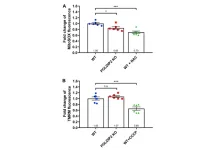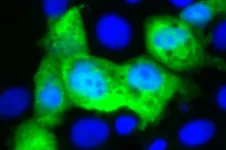(Press-News.org) A new perspective published in the journal Nature Chemical Biology uncovers a previously unknown biochemical recycling process in animals. The authors review a flurry of recent papers demonstrating that animals extensively recycle biochemical waste to produce novel chemicals that play key roles in biology, from regulating behavior to development and aging.
These studies show that the genes previously thought to code for carboxylesterases, enzymes that hydrolyze esters, actually play a pivotal role in assembling a wide range of new metabolites from building blocks generally considered “cellular waste.” Surprisingly, the so-called carboxylesterases were found to contribute to the formation of esters and amide bonds, a function opposite to that predicted by computational algorithms.
“This discovery reveals that our understanding of biochemistry remains largely incomplete,” says the perspective’s lead author, Frank Schroeder, a professor at Boyce Thompson Institute (BTI). “This research has the potential to revolutionize our understanding of how animals, including humans, function.”
Recent investigations indicate that animals and humans may produce over 100,000 distinct chemicals, most of which have not been investigated. This unknown structure space is a treasure trove of chemicals, which may hold the key to understanding many biological processes. One major challenge to understanding how these metabolites contribute to survival is that the enzymes that produce them are also unknown.
“The discovery of this biochemical recycling mechanism opens up exciting new avenues for future research, with the potential to dramatically accelerate the structural and functional annotation of unknown metabolites,” says Chester Wrobel, a graduate student in the Schroeder lab and co-author of the perspective.
About the Boyce Thompson Institute (BTI)
Opened in 1924, Boyce Thompson Institute is a premier life sciences research institution located in Ithaca, New York. BTI scientists conduct investigations into fundamental plant and life sciences research with the goals of increasing food security, improving environmental sustainability in agriculture, and making basic discoveries that will enhance human health. Throughout this work, BTI is committed to inspiring and educating students and to providing advanced training for the next generation of scientists. BTI is an independent nonprofit research institute that is also affiliated with with Cornell University. For more information, please visit BTIscience.org.
###
END
From waste to wonder: unlocking nature’s biochemical recycling secrets
2023-04-11
ELSE PRESS RELEASES FROM THIS DATE:
Yossi Sheffi on AI and the future of the supply chain
2023-04-11
Global supply chains are immense feats of technological and organizational sophistication. They are also, as the onset of the Covid-19 pandemic showed, vulnerable to unexpected developments. Will that change as artificial intelligence becomes a bigger part of supply chains? And what will happen to workers in the process?
MIT Professor Yossi Sheffi explores these topics in a new book, “The Magic Conveyor Belt: AI, Supply Chains, and the Future of Work,” published by MIT’s CTL Media. Sheffi, the Elisha Gray II Professor of Engineering ...
Tax credit tool tracks EV savings
2023-04-11
Oak Ridge National Laboratory researchers have developed an online resource to help consumers understand the electric vehicle tax credits available through the Inflation Reduction Act.
Located on the Department of Energy’s fueleconomy.gov website, the tool shows eligible vehicle models along with the corresponding federal tax credit.
The new clean vehicle tax credit is for purchases of all-electric, plug-in hybrid electric and fuel cell electric vehicles in 2023 and beyond. A separate credit is available for eligible used vehicles purchased in 2023 or after. Information on credits for vehicles purchased before ...
Knockout of AMD-associated gene POLDIP2 reduces mitochondrial superoxide in retinal cells
2023-04-11
“To our knowledge, this is the first functional study of POLDIP2 in retinal cells to understand its potential role in AMD.”
BUFFALO, NY- April 11, 2023 – A new research paper was published in Aging (listed by MEDLINE/PubMed as "Aging (Albany NY)" and "Aging-US" by Web of Science) Volume 15, Issue 6, entitled, “Knockout of AMD-associated gene POLDIP2 reduces mitochondrial superoxide in human retinal pigment epithelial cells.”
Genetic and epidemiologic studies have significantly advanced our ...
New approach targets norovirus, world’s leading cause of foodborne infection
2023-04-11
Every year, norovirus causes hundreds of millions of cases of food poisoning — and the deaths of at least 50,000 children — yet there exists no real way to control it. The virus has proven exceptionally difficult to study in the lab, and scientists have struggled to develop effective vaccines and drugs.
A new study at Washington University School of Medicine in St. Louis describes a creative way to make a vaccine against norovirus by piggybacking on the highly effective vaccines for rotavirus, an unrelated virus that also causes diarrhea.
The ...
Electrification push will have enormous impacts on critical metals supply chain
2023-04-11
ITHACA, N.Y. – The demand for battery-grade lithium, nickel, cobalt, manganese and platinum will climb steeply as vehicle electrification speeds up and nations work to reduce greenhouse gas emissions through mid-century. This surge in demand will also create a variety of economic and supply-chain problems, according to new Cornell University research published in Nature Communications.
In the new paper, senior author Fengqi You, professor in energy systems engineering, and his colleagues examined 48 countries that are committed to playing a strong role in electrifying transportation, including the U.S., China and India.
Under ...
Takeda licenses small molecule developed by Krembil Brain Institute researchers, targeting tau protein implicated in Alzheimer’s disease
2023-04-11
As announced today in a press release by biotechnology company Treventis, global pharmaceutical company Takeda has agreed to exclusively license a group of small molecules that target tau – a protein in which misfolding and aggregation are believed to be a cause of Alzheimer’s disease.
The molecules were developed by the team at Treventis, building upon the Alzheimer’s & neurodegenerative research expertise of Dr. Donald Weaver’s lab at UHN.
“There are currently no effective drugs out there that target tau in the brain,” says Dr. Donald Weaver, Senior ...
Mount Sinai researchers discover novel receptors for SARS-CoV-2 and their age-dependent expression, providing new insights for public health
2023-04-11
New York, NY (April 11, 2023) – A study led by Mount Sinai researchers Dr. Bin Zhang, the Willard T.C. Johnson Research Professor of Neurogenetics, and Dr. Christian Forst, an Associate Professor in the Department of Genetics and Genomic Sciences, have identified potential novel receptors for SARS-CoV-2 and unveiled their tissue-specific and age-dependent expression. The findings were published on March 23 in the Federation of European Biochemical Societies Letters.
The study's multiscale network analysis suggests that SARS-CoV-2 utilizes multiple novel receptors, such as the TYOBP receptor CD300e, to facilitate ...
Perfume component helps lure male moth pests
2023-04-11
North Carolina State University researchers have shown that adding a small amount of a chemical used in perfumes – nonanal – to a two-chemical combination of other sex pheromones helped increase the cocktail’s effectiveness in mimicking female fall armyworm “come hither” calls to males.
The findings could eventually help farmers better detect, monitor and control fall armyworm populations, which negatively affect some 350 plant species – including crops like corn and cotton as well as turfgrass and other cultivated grasses.
“Nonanal is emitted ...
Genomic surveillance identifies global strain of emerging wheat disease fungus
2023-04-11
Pests and diseases may reduce global wheat yields by over 20%. A study published April 11th in the open access journal PLOS Biology by Sergio Latorre at University College London, UK and colleagues suggest that genomic surveillance may be an effective disease management tool with the ability to trace lineages of emerging crop diseases, and to identify genetic traits for breeding disease-resistant lines.
Wheat crops across the globe are threatened by wheat blast, an emerging fungal disease. However, disease-management strategies have been unsuccessful. In order to better understand ...
$9.5M to fund cross-disciplinary chronic fatigue research
2023-04-11
ITHACA, N.Y. -- A Cornell multidisciplinary research center that studies chronic fatigue syndrome has received a five-year, $9.5 million grant from the National Institutes of Health’s National Institute of Allergy and Infectious Disease – funding that will enable experts from disparate fields to work together on the mysterious and debilitating condition.
The Cornell Center for Enervating Neuroimmune Disease, established in 2017, ultimately seeks to understand the biological ...





